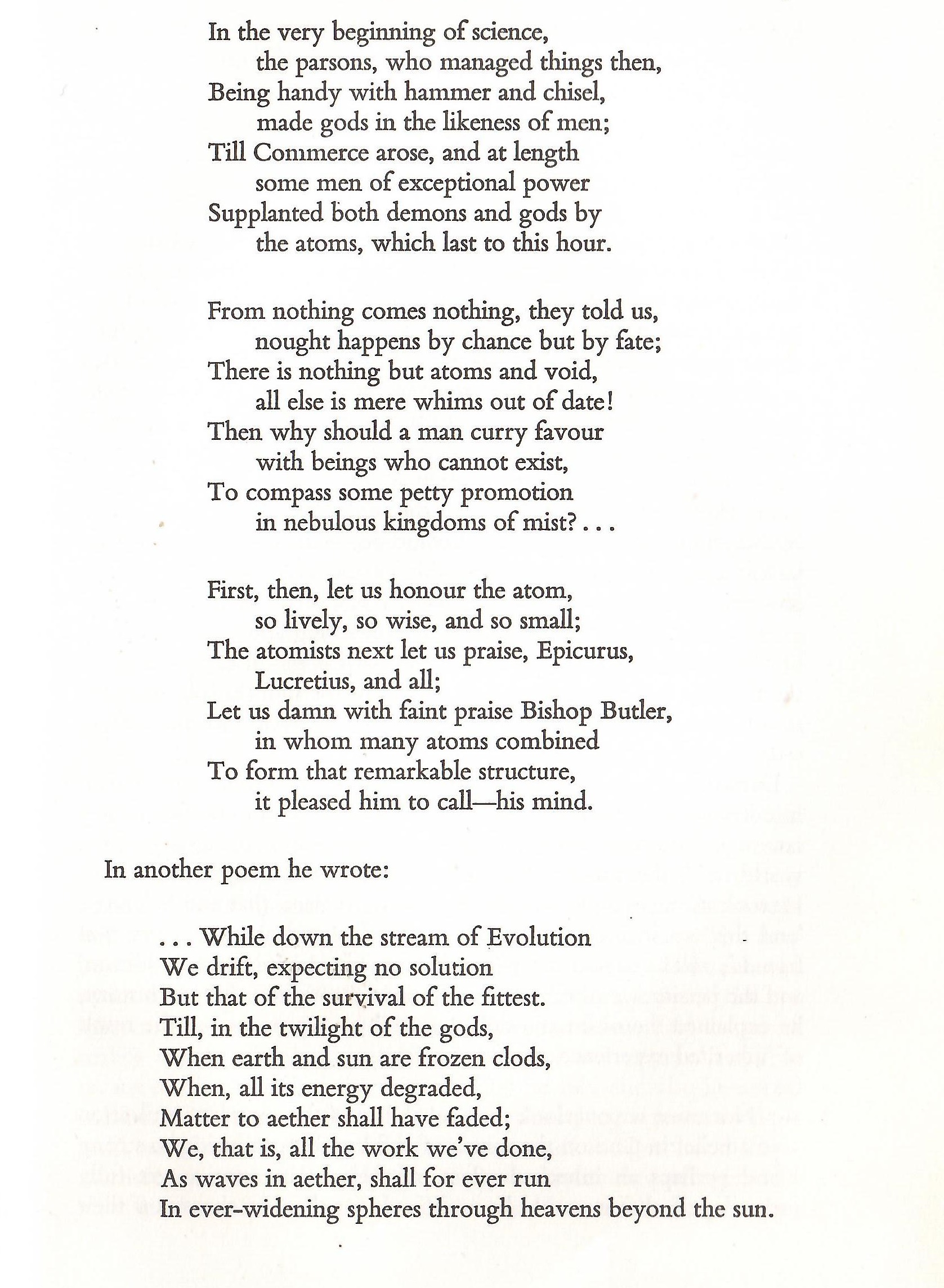Writer ATOMS article in 1875 Encyclopedia Britannica
Of primary importance to my discoveries are Britannica’s exhaustive section on Chemistry and its article on the science of Atomic Processes by James Clerk Maxwell. The combination of your book and these articles enlightened me about the universal process that is the eternal cause of all things.
In Britannica’s article about the Atom, Maxwell first summarizes your theory of evolution and then describes a comparison of that with the composition of elemental atoms. He writes the following.
But a theory of evolution of this kind cannot be applied to the case of atoms, for the individual atoms neither are born nor die, they have neither parents nor offspring, and so far from being modified by their environment, we find that two atoms of the same kind, say of hydrogen, have the same properties, though one has been compounded with carbon and buried in the earth as coal for untold ages, while the other has been “occluded” in the iron of a meteorite, and after unknown wanderings in the heavens has at last fallen into the hands of some terrestrial chemist.
James Clerk Maxwell
Maxwell exposes the two levels of processes operating as our visible world and the particle universe beneath it. There are the processes of our sensible universe, such as Natural Selection. And beneath that, there is the particle level, where processes of a different character operate.
Natural Selection operates in the world of things, where local, temporal and discrete things come to be, exist for a time, and pass away. On this level of process things are limited by boundaries. The boundaries may be porous and ill-defined but they delineate things as discreet entities that are limited to a distinct location in space and time. This is the world of things we experience with our senses and the universe we observe using telescopes.
Our sun and the earth came to be by these processes, so local, and temporal does not imply brief and small, since some bounded things endure for long periods and occupy vast spaces. The orbits of the planets, our ocean tides, and other cyclical processes in the world of things appear to operate with complete invariability but an eternal view of these things reveals that they came to be and will pass away like any other bounded thing.
In our world of things, the processes by which bounded things come to be, masquerade to our perceptions as paradigmatic but are heuristic in nature. Natural Selection is a process that is archetypical of this dynamic.
Since in theory every variation could be beneficial to each organism those variations which prove not to be beneficial are errors. Organisms exist to thrive so variations that fail to benefit thriving are by definition errors. A true paradigmatic process would not only operate by some apparent law of action, it would also not produce errors.
What Maxwell pointed out with his comparison is that elemental atoms, by whatever subatomic processes they come to be, do not come to be with beneficial or detrimental variations, ‘though one has been compounded with carbon and buried in the earth as coal for untold ages, while the other has been “ occluded” in the iron of a meteorite.’ Processes operating in the particle universe are paradigmatic, their operations are invariable and don’t generate errors.
This particle level is where the true uniformitarian process operates. The variable changes in the sensible universe of our perceptions are the results of this invariable process. Beneath the heuristic processes of the world we see is the invisible paradigmatic level of particle matter, where the physical universe is actually one invariable ongoing universal process. A unitary process that envelopes the heuristic world of variability and error into its invariable particle reality.
Not only is this level inaccessible to ordinary sense perceptions it is alien to us. We are everything it is not. We are local, temporal, and discrete beings, while the particle universe is infinite, eternal and boundless. We come to be as a bounded being at one place in time and space, we exist for a time in a limited amount of space, and then we pass away. Because of this, we have a story. Narrative is inherent in the nature of our being. Unlike us in every way, the particle universe operating by one uniform paradigmatic process is by nature impossible to narrate as story. Scenes are the basis for all narrative, and in unchanging particle reality there are none of the distinct events that create dramatic scenes.
In the particle universe, the cast of characters is duplicated by infinite number giving the whole thing an undramatic nature. There are no heroes, no villains, no extras. There is no beginning, middle or end. Nothing incites its non-beginning. Nothing makes its non-ending meaningful. There is no foreground, no background and no place that is not the stage of action from which an audience could view it. This anti-narrative essence is most obvious, but also the last one most people would ever consider important. Even now you may not have grasped the significance of this simple aspect of scientific reality.
Two Poems by James Clerk Maxwell from Appendix II
The Act of Creation by Arthur Koestler
For the complete version of the first poem including an analysis
British Association, Notes Of The President’s Address

My Paperback Books on Amazon


